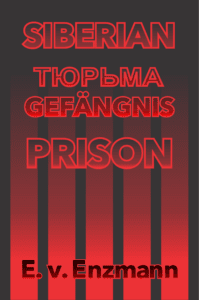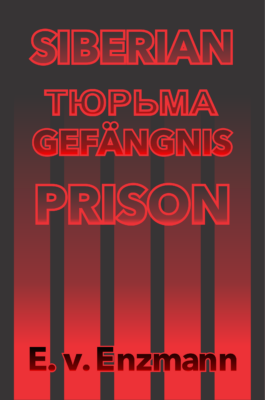From the Desk of Thoth – Histories both Classical and Enzmann: Siberian Prison
Edmund Devine
”I want to go home, I want to go home. Shrapnel it rattle and cannons they roar; Don’t send me back to those trenches no more. Take me back o’er the sea where the Aleman can’t get at me. Oh my, I don’t want to die, I want to go home.”
-English War Song
This blog post is to promote and provide some background to the upcoming Endeavor post about Ernst Vincent Enzmann’s book ‘Siberian Prison.’ Here I can go a bit more in-depth about Ernst’s life and, by extension, Dr. Robert Duncan Enzmann’s life. This should be used in conjunction with the Endeavor post up-coming this quarter, and in further conjunction with the book ‘Siberian Prison.’
Dr. Ernst Vincent Enzmann was born May 23rd, 1893 in the city of Karlsruhe, within the Grand Duchy of Badan, an electorate of the German Empire to Franz Enzmann and Franzisca nee: Hantschmann, one of nine siblings. Soon after his birth, his family moved the Kingdom of Bohemia within the Austro-Hungarian Empire, (modern-day Czech Republic), to the town of Kronstadt, Bohemia. As he grew up he found a deep love of education, working towards and eventually succeeding at working as a kindergarten and primary school teacher. Working for four years on his Masters he passed up the completion of it to serve voluntarily for one year at the young age of twenty-one in the Austro-Hungarian Army at the outbreak of hostilities in 1914.
This is the set-up for ‘Siberian Prison’ and where Ernst begins his tale of his adventure through the horrors of the Great War. FREA Inc. has republished ‘Siberian Prison’ with a new edition, this edition is in a new, larger print with more corrections to mis-spellings. This book is larger in page count due to the larger print but shorter overall as the appendix from the first edition has been removed from the rear of the book. This gives the individual reader a better and more easily flowing book as a result of these changes. ‘Siberian Prison’ is a unique book, it is one of the few English language Austro-Hungarian Great War memoirs that is easily accessible and understandable. Ernst does not over-complicate things by superfluous details or tangent side tracks. The man is not a ‘storyteller’ in a prose sense, he is a storyteller in the oral sense. He keeps you interested throughout the book, even if all he is telling you about is the thirtieth ‘forced march’ that leads to nothing and ends up with them back exactly where they started. Many stories and memoirs of the Western Front tend towards a romanticized telling of the horrors of war and the classical anti-war writings that one would see a similar drawing towards during the Vietnam war in the US. Ernst is blunt in his work, he speaks truthfully about the failings of the Austro-Hungarian nation and military and speaks honestly about not wishing to be in the conflict, but not because of some pacifistic tendency, but more so for the fact that war is not a pleasant experience most of the time! Even when the bullets are not flying the majority of his time is spent scrounging for food and marching, waiting, or being taught how to salute. War is plainly shown by him to be a matter of bursts of a few minutes of violent, explosive energy followed by days, weeks, months even of a near wandering, monotonous malaise. This is why I view this story so highly because he captures that malaise of waiting so simply and so plainly that it is a refreshing sight to behold after reading many, many memoirs of soldiers from both the Great War and on.
Dr. Ernst Enzmann also seemingly learned his knack of psychology in the Army firsthand, Ernst was a P.O.W two times in the conflict, once for a short period of time and the second, which is the send half of the book and shall not be gotten into within the scope of this blog post, the first time after escaping and fleeing back to Austro-Hungarian lines Ernst had the classic symptoms of ‘shell shock’ as it was called back then. He lost the ability to speak for some time, only gaining it back seemingly at random during his recuperation back in Austria. This seemed to spark an interest in the field of psychology as he went on to teach it when in America after the conflict and his marriage to Mrs. Florence Enzmann nee: Goodman. Not only that Dr. E.V. Enzmann studied biology and specialized in studying ants, of which multiple papers were published in his lifetime on the subject. A scholastic of many fields of medicine, biology, and education Dr. E.V. Enzmann is similar to his son Dr. R.D. Enzmann in that sense. Whilst their fields differed, one can see the similarities of the father and sons adoration and joyful pursuits of scholastic knowledge. Many of Dr. R.D. Enzmann’s books within his library came from his father’s own, and they corresponded frequently up until Dr. E.V Enzmann’s death in 1978. From his life we gained one of the most brilliant men of the 20th century, and for that, we will always be grateful for Dr. Ernst Enzmann and his survival through that bloody, horrific conflict.
One can purchase ‘Siberian Prison’ from the enzmannarchive.org under publications subsection memoirs. It is available in e-book ($5.17), paperback ($35.00), and hardcover ($47.00) editions there, and is well worth the read. Furthermore, one can explore the archive itself in its entire digital format by subscribing to enzmannarchive.org for only $9.99 a month or $99.99 a year! Well worth it for a lover of the many varied scholastic studies that Dr. Enzmann participated in during his long life.





